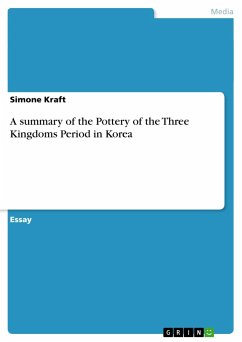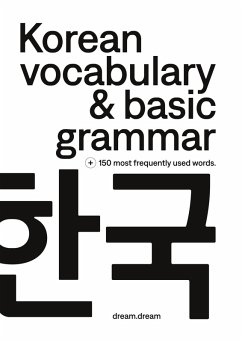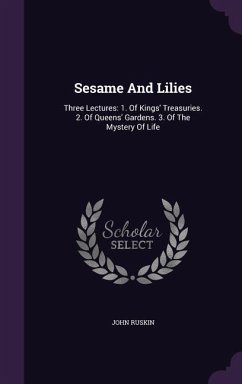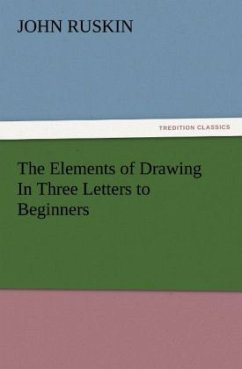
A summary of the Pottery of the Three Kingdoms Period in Korea

PAYBACK Punkte
0 °P sammeln!
Essay from the year 2003 in the subject Art - Arts and Crafts, grade: A-, School of Oriental and African Studies (SOAS) (Department of Art and Archaeology), course: History of Korean Art, language: English, abstract: The so-called Three Kingdoms Period marks a phase of coalescence in Korean history. Three empires - Kogury , Paekche and Silla - established independent reigns. In addition, several states, collectively referred to as Kaya, existed, yet even though located close to each other, they never became one state. The formation of the kingdoms dates back to the first century BC, however, t...
Essay from the year 2003 in the subject Art - Arts and Crafts, grade: A-, School of Oriental and African Studies (SOAS) (Department of Art and Archaeology), course: History of Korean Art, language: English, abstract: The so-called Three Kingdoms Period marks a phase of coalescence in Korean history. Three empires - Kogury , Paekche and Silla - established independent reigns. In addition, several states, collectively referred to as Kaya, existed, yet even though located close to each other, they never became one state. The formation of the kingdoms dates back to the first century BC, however, their importance arose only in the fourth century after the Chinese Han commandery and thus the Chinese hegemony broke down. While the earlier centuries became denominated as Proto-Three Kingdoms Period, the phase which is to be dealt with in this essay is the Three Kingdoms Period, dating from c. 313 to 668. This phase came to an end when one of the kingdoms, Silla, finally managed to gain hegemony. The importance of this period arises from its pottery - t'ogi - which is crucial to understand the renowned ceramic tradition of Korea. Both technical and stylistic innovations were achieved, so the earliest high-fired wares of the world are to be found not only in China but also in Korea. Furthermore, the potter's wheel was largely used. The present essay aims to depict the most important features of these developments by portraying each of the three kingdoms and the city states separately. Firstly, a short outline of the historical and geographical development needs to be given. Especially the "foreign" influences must be considered, such as the introduction of Buddhism and contact to China. Secondly, the most important characteristics and achievements of the art of pottery are examined. Short presentations of the most typical art objects of every region will be given to underline the explanations. Though on account of the brevity of this essay, no excavation sites will be considered and no other materials will be mentioned.













